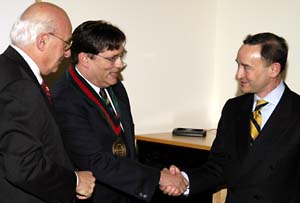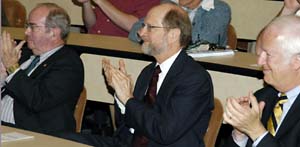A pioneer in brain imaging research, Steven E. Petersen, Ph.D., has been named the first James S. McDonnell Professor in Cognitive Neuroscience.
Petersen is director of the Division of Neuropsychology in Neurology, professor of anatomy and neurobiology and of radiology and associate professor of neurological surgery. He also serves as professor of biomedical engineering in the School of Engineering & Applied Science and professor of psychology in Arts & Sciences.

In addition to his six academic appointments, Petersen is co-director of the neuroscience program in the School of Medicine.
The new professorship was established from a gift from the James S. McDonnell Foundation given to the University in 1980 to institute the McDonnell Center for Higher Brain Function.
Chancellor Mark S. Wrighton and William A. Peck, M.D., former executive vice chancellor for medical affairs and dean of the School of Medicine, made the announcement.
“The McDonnell family and their foundation have been extremely supportive of the University for many years,” Wrighton said. “Their generosity and support continue to be critical in the advancement of our exceptional neuroscience program, in which Steve Petersen is an influential participant and leader.”
Peck added, “His research is a prime example of the importance of understanding how the brain works, a goal that the McDonnell family has helped encourage for many years. I can think of no one more qualified and capable of representing the McDonnnells’ commitment to this University and to the field of brain research.”
Petersen is known for his research on how the brain processes information and functions during daily life. As one of the pioneers in brain imaging, Petersen uses several modern techniques, including positron emission tomography and functional magnetic resonance imaging to directly observe the human brain during learning, memory and attention tasks.

He also investigates the effects of disease and brain damage on these cognitive processes, bridging a range of psychological and neurological fields.
The late James S. McDonnell is one of the country’s honored aerospace pioneers. He first learned to fly in the Army Air Service, serving as a second lieutenant between earning a bachelor’s degree with honors in physics from Princeton University in 1921 and a master’s degree in aeronautical engineering from Massachusetts Institute of Technology in 1925.
After working in many of the small but numerous aircraft plants of that era, McDonnell founded his own company in 1939, known as the McDonnell Aircraft Corp., in St. Louis.
The company grew from its meager beginnings at Lambert Field into one of the world’s largest aerospace companies. In 1967, the company merged with Douglas Aircraft, and in 1997 McDonnell Douglas merged with The Boeing Co., forming the world’s largest aerospace company. Its Integrated Defense Systems group, representing over one-half of Boeing’s business, is headquartered in St. Louis.
In addition to leading his company’s many achievements, including building the first jet aircraft to operate from a U.S. aircraft carrier and developing America’s first manned spacecraft, McDonnell also was a longtime supporter of the United Nations and served as chairman of the United Nations Association of the United States of America.
In 1950, he established the James S. McDonnell Foundation to “improve the quality of life.” Today, the foundation abides by that mission by contributing to the generation of new knowledge through its support of research and scholarship.
McDonnell established his first University professorship in the space sciences in 1964 and established the McDonnell Center for the Space Sciences in 1975.
The foundation’s continued support of programs at the University reflects McDonnell’s main interests, which include genetics and human cognition.